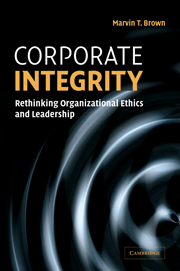Book contents
- Frontmatter
- Contents
- Preface
- 1 The context for corporate integrity
- 2 Cultural integrity as openness
- 3 Interpersonal integrity as relational wholeness
- 4 Organizational integrity as pursuing a worthwhile purpose
- 5 Social integrity as civic cooperation
- 6 Environmental integrity as natural prosperity
- 7 Corporate integrity and organizational leadership
- Appendix: Assessment worksheets
- Bibliography
- Index
4 - Organizational integrity as pursuing a worthwhile purpose
Published online by Cambridge University Press: 05 September 2012
- Frontmatter
- Contents
- Preface
- 1 The context for corporate integrity
- 2 Cultural integrity as openness
- 3 Interpersonal integrity as relational wholeness
- 4 Organizational integrity as pursuing a worthwhile purpose
- 5 Social integrity as civic cooperation
- 6 Environmental integrity as natural prosperity
- 7 Corporate integrity and organizational leadership
- Appendix: Assessment worksheets
- Bibliography
- Index
Summary
The exploration of the two dimensions of corporate integrity reviewed so far have shown that corporate communication patterns should be designed for the inclusion of differences and disagreement and for relationships of secure civic reciprocity. These conclusions were drawn from answering the first two challenges of integrity, which required cultural openness and relational wholeness. Do these types of relationships really fit with the purpose of corporations? This chapter demonstrates that they do. The demonstration, of course, belongs to the book's overall approach of working from a civic perspective, focusing on relationships, and using a method of examining and changing communication patterns. The difference in this chapter is that organizations are also seen as agents. This means that integrity requires a consistency between their purpose and their actions. To understand the integrity challenge on this dimension of corporate life, it is necessary to understand what it means for corporations to pursue a worthwhile purpose.
“Why should corporations exist?” “What are they good for?” These questions will elicit different answers depending on the perspective from which they are addressed. An economic or financial perspective, for example, would give a quite different answer than a managerial perspective, or the civic perspective. Whether the question addresses the individual, organizational, or social level of analysis will also make a difference. This chapter primarily focuses on the organizational level, not because the other two are insignificant, but because that is where the challenge of organizational integrity exists: the question of a worth- while purpose.
- Type
- Chapter
- Information
- Corporate IntegrityRethinking Organizational Ethics and Leadership, pp. 101 - 130Publisher: Cambridge University PressPrint publication year: 2005



